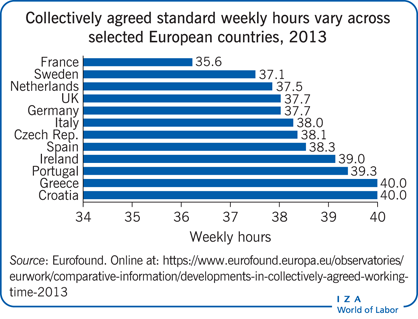Elevator pitch
Standard hours, a major component of total work hours, vary considerably across Europe. Many countries lowered their standard work hours during the 1980s and 1990s, attempting to boost employment by splitting up a fixed number of worker-hours among more workers. Germany has seen a partial reversal of the trend as several companies increased their standard hours to reduce their labor costs in the early 2000s. The employment effect of increased standard hours depends on the time horizon examined, how wages respond, whether employees collected overtime pay before the change, and the productivity of hours worked, among other factors.

Key findings
Pros
If monthly income remains constant, increasing standard hours reduces hourly wage costs.
Extending standard hours can reduce expensive overtime work.
If the increase in standard hours is not perfectly offset by a reduction in overtime (implying that total hours also go up), fixed labor costs are spread over more hours and capital can be utilized longer.
Increasing standard hours can have positive scale effects if the reduction in costs leads to an increase in output, boosting demand for labor.
The proportion of “non-productive” time devoted to starting up and finishing work likely falls when standard hours rise.
Cons
If production is fixed or not increased enough, fewer workers are needed to produce a certain output when standard hours rise.
Employees who work longer at constant monthly pay are worse off when standard hours rise.
Employees who work longer hours have less time for training when standard hours rise.
Increases in working time at constant pay may lead to disincentive effects.
If a job consists of a given package of weekly hours of work and monthly earnings, then an increase in standard hours has no effect because overtime hours and the hourly wage adjust to preserve the original package.